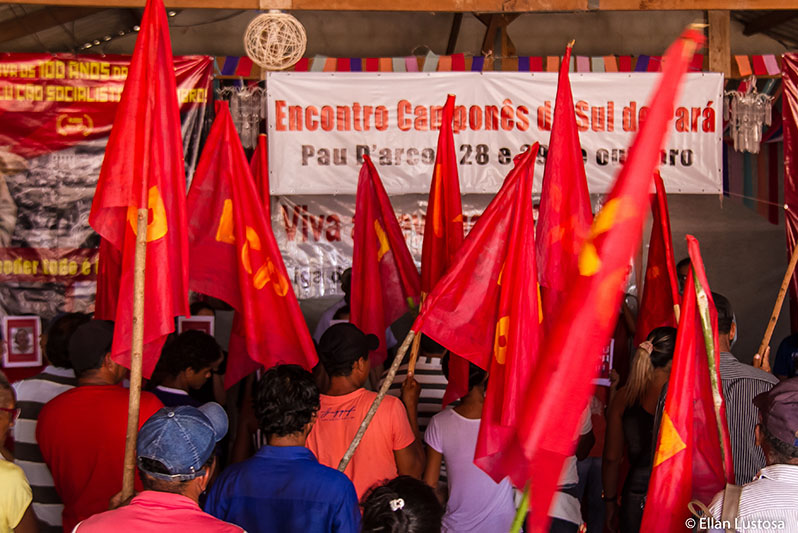Since the massacre of Pau D’Arco in June 2017, the peasants in Jane Júlia settlement – in part of the Santa Lúcia farm, where the massacre took place – continue to resist bravely, despite the terror made by the landlords (threats, attacks, murders and provocations), overcoming debilities and advancing in the production and organization of the area.
After 7 months making empty promises to the peasant families, in December 21 the National Institute of Colonization and Agrarian Reform (Incra) was forced to accept buying the lands of the farm – retaken by the peasants in June 13 with the support of the Poor Peasants League of the South of Pará and Tocantins – to regularize the ownership for the families during a meeting of the Incra Regional Decision Committee, this was a result of the vigorous mobilizations of the peasants made during all this time.
The meeting took place in the same place of the historical Peasant Meeting of the South of Pará in October 28 and 29 2017, where peasants from the region, indigenous and quilombola representatives, Brazilian Association of People’s Lawyers (Abrapo) Brazilian Center of Solidarity to the Peoples (Cebraspo) representatives and other regional and national movements to reaffirm in the path of struggle for the land in the region. The Poor Peasants League and the New Victory Association of Jane Júlia Settlement were there to denounce that the old State was not giving anything, that this decision was a result of the struggle and demanded justice against the release of 15 police officers charged of participating in the massacre. Many banners and flags of the League were filling the meeting place, as well as the image of the 11 murdered peasants.

Peasant Meeting in Pau D’Arco, October 28 2017
The Massacre of Pau D’Arco generated a contradiction among the members of the judiciary and the Public Ministry, due to the negative repercussion after the release of the preventive arrest of the 15 police officers the president of the Superior Justice Court (STJ) decided for the return of 8 police officers to preventive arrest, alleging their release threatened the public order and the judicial process of the massacre at the same time the Regional Justice Court of Para had conceded freedom alleging the inquiry was already done. In July the judge of Redenção court decreed the preventive arrest of 13 police officers involved in the massacre and less than a month after the substitute judge of the same court suspended the preventive arrest, releasing them. In September 26, 15 police officers were preventive arrested because of the involvement in the massacre and denounced with homicide, homicide attempt, torture, crime association and fraud. 17 police officers out of the 29 who participated in Pau D’Arco massacre were denounced by the Public Ministry, even though the release of the officers ignores intentionally the large quantity of evidences and testimonies, the investigations do not try to find the ones who sent them. The judiciary and its members are fundamental to consolidate and maintain the latifundium class interests and the people should never nourish illusions about them.
The peasants will keep struggling against the wave of ownership repossessions through the country, advancing in the production and organization relying on their own forces. This is the path of struggle the peasants are taking in Brazil, “conquer the land! destroy latifundium!”, and each time more peasants are being incorporated in quantity and quality for the Agrarian Revolution.
